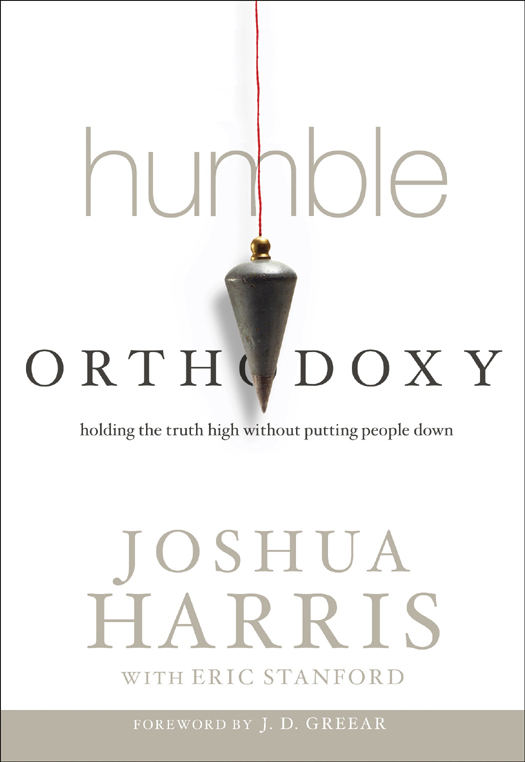It wasn’t long into my work as a youth pastor before I found myself turning almost weekly to Paul’s exhortation to Timothy: “The Lord’s servant is not quarrelsome, but kind to everyone, able to teach, patently enduring evil, correcting his opponents with gentleness” (2 Tim. 2:24–25). Paul desired that his young protégé care deeply for truth, guard the great deposit, and teach with authority. Yet this zeal to promote the right doctrine among God’s people should be guided by patience, gentleness, and love for others.
As I sought to serve as a minister of the gospel, God began to slowly—and, at times, painfully—reveal that my passion for truth wasn’t matched by an equally ardent love for others; my eagerness to teach the Word of God didn’t correspond with the same commitment to apply the Scripture to my own life. I knew the truth, and I knew how to defend it, but I was often proud, condescending, and hypocritical.
Can you relate?
Call to Truth and Grace
In his latest book, Humble Orthodoxy: Holding the Truth High Without Putting People Down, Joshua Harris, lead pastor of Covenant Life Church in Gaithersburg, Maryland, offers both challenge and also hope to Christians whose love for right doctrine has begun to outstrip their love for God and neighbor. With pastoral sensitivity and a keen ability to unearth our hidden motivations with direct, heart-searching questions, Harris calls all believers to embrace grace and truth, love and right doctrine, compassion and solid theology. “We don’t get to choose between humility and orthodoxy,” Harris writes. “We need both” (6).

Humble Orthodoxy: Holding the Truth High Without Putting People Down
Joshua Harris
Humble Orthodoxy: Holding the Truth High Without Putting People Down
Joshua Harris
As Harris observes, a person might exhibit an “arrogant orthodoxy” where his dedication to correct doctrine is characterized by anger, bitterness, and the inclination to look down on others. This person might defend every essential article of the faith with penetrating clarity and scholarly rigor, but his demeanor is harsh and his approach overbearing. On the other hand, someone walking in “humble heterodoxy” will be so worried about offending others that he refuses to form and express biblical convictions. He might be warm and inviting, but he’s departed from historic Christianity and the truth of the gospel.
In contrast to these options, “humble orthodoxy” grows in the rich soil of God’s grace with an unrelenting focus on the glory of God and the welfare of others. Arrogant orthodoxy and humble heterodoxy have one thing in common: they flourish best when focused on your own interests. A doctrinal stalwart who’s proud and condescending is usually just concerned with being right; a person who’s too nice to say anything confrontational is only worried about self-preservation. Neither was an option for the apostle Paul. “For Paul, [preservation of Christian orthodoxy] wasn’t about proving someone else wrong, winning an argument, or adding people to his little club. For Paul, orthodoxy made the difference between life and death, heaven and hell” (9). So “truth matters,” Harris writes, “but so does our attitude” (12).
Keys to Humble Orthodoxy
Yet it might be easy among those most fervent for the truth to mistake self-righteous pride for godly zeal. “We tell ourselves that we’re fighting for orthodoxy and for biblical faithfulness,” Harris observes, “but in subtle ways our heart struggle becomes about our identity, our rightness, our purity, our truth. And it becomes less and less about who God is and his glory and his name” (23). These motivations are countered, however, when the worship of God becomes our all-consuming focus. “[Worship] must always be the driving passion behind our pursuit of biblical orthodoxy. Not to prove ourselves right or better than someone else but to better worship the holy God, the one who forgives and accepts us for Christ’s sake alone” (25). When our supreme desire is to delight in the God of truth, we’ll often find that humble, holy affections follow in the wake of genuine worship.
Ironically, Harris’s exhortations will only have the effect of strengthening our pride if we aren’t careful to go to the root of genuine humility. At the very bottom of humble orthodoxy is a wholehearted recognition of God’s grace (18–22). God’s mercy alone—not our intellect, personal righteousness, good works, or any other factor—is the reason why we’ve embraced Christ. Regularly returning to this foundational truth will help slay pride and cultivate true humility.
Another basic ingredient to humble orthodoxy is Christian practice. “Do you want to keep your orthodoxy humble?” Harris asks. “Try to live it. Don’t spend all your time theorizing about it, debating it, or blogging about it. Spend more energy living the truth you know that worrying about what the next person does or doesn’t know. Don’t measure yourself by what you know. Measure yourself by your practice of what you know” (37). These are wise, penetrating words. Our Christian maturity is not gauged by our knowledge of the truth or our ability to discern sin and ignorance in others. Indeed, our spiritual judgment remains skewed until the truth has pierced our own hearts and uprooted the sin and foolishness within (Matt. 7:1–4). You might even be thinking right now about how your roommate, brother, sister, pastor, or fiancé would benefit from reading this book. If so, then you might be subtly avoiding the implications of Harris’s argument. Humble orthodoxy begins with you, not others.
Does Humble Orthodoxy Work?
Harris doesn’t lead us to conclude, however, that other people will always respond positively to humble orthodoxy. An unbeliever or Christian mired in sin may find fault with our orthodoxy not matter how humble, and they may equate our firm compassion with self-righteous nosiness regardless of our approach. But we don’t pursue humility and doctrinal fidelity for the approval of others; we practice these things because we love God and desire his approval. Harris reminds us:
The gospel will always be offensive to sinners. . . . False teachers will still thrive and gain their followings and, to add insult to injury, will be better liked than we are. But that’s not the point. Humble orthodoxy is not a technique to win a following. That’s not why it matters. It matters because God’s truth matters and because the reality of God’s character must shape ours. We must be ready to suffer for the truth of God’s Word and still be gracious and compassionate. . . . This is how we receive his approval. (60–61)
On the whole, Harris’s Humble Orthodoxy is filled with seasoned and timely counsel. I hesitate, therefore, to suggest any areas of real weakness. Having said that, I would have liked to see Harris define humility a little earlier in the book. (We don’t encounter a definition until page 29.) Given the effect of postmodernism on much of our public thinking, I wonder if some might find his call to humble orthodoxy afflicted with an inherent contradiction before his exhortations even get off the ground: doesn’t humility mean that we are not sure about specific things—like orthodoxy? Prior to his definition, Harris implies humility shouldn’t be equated with doctrinal uncertainty (9, 12). Nevertheless, by clearly defining his terms earlier in the book, Harris could’ve avoided any potential confusion at this point.
Moreover, some readers may not like Harris’s broad definition of orthodoxy (see page 2). They may want to see more doctrines added to this list of essentials. But if this is your main gripe with the book, then you’ve probably missed the point. The aim of Harris’s work is not to provide a theology of the relative importance of Christian doctrines; it’s to challenge Christians to pursue a rugged commitment to truth that is shaped and distinguished by compassion, love for one’s enemies, and a heartfelt desire for the lost to embrace the gospel. It’s a call for truth and grace. It’s a call for a humble orthodoxy.




































